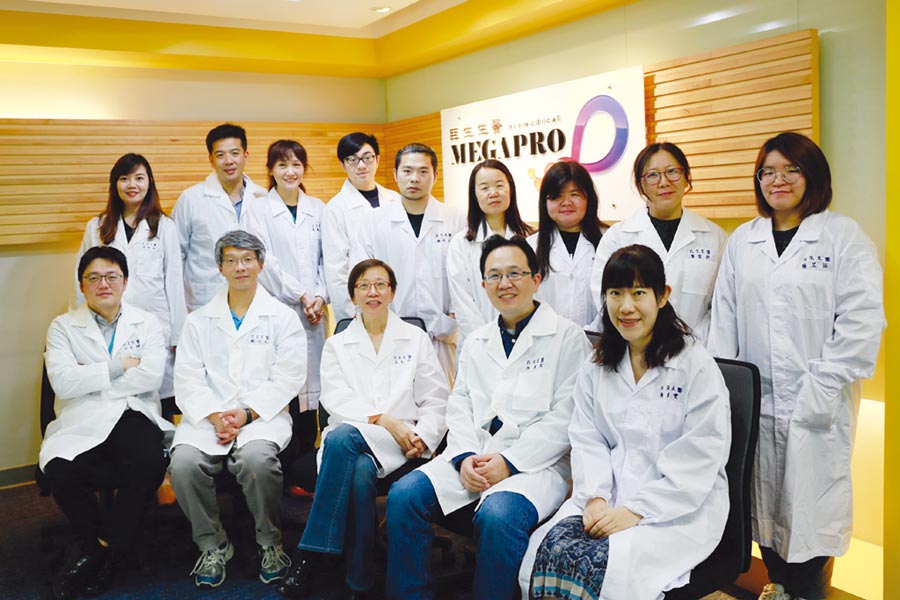MegaPro Biomedical announces new products at Bio Iron Conference in Germany
Dr. Jassy Wang, general manager of MegaPro Biomedical, Co. (third from left in the front row), led the team to win the "15th National Innovation Award - Enterprise Innovation Award" last year. Their announcement regarding the latest product research at the Bio Iron Conference in Germany last month received a warm response. Photograph / Li Hanmin
In May, MegaPro Biomedical, Co. participated in the biennial Bio Iron Conference held in Heidelberg, Germany, and announced the company's product MPB-1514 Iron-deficiency Anemia Iron Supplements. The treatment will not cause the concentration of Fibroblast growth factor 23 (FGF23) to increase in the body, thereby avoiding the occurrence of severe hypophosphatemia and other related side effects. Several clinical trials have pointed out that after treating patients with a high-dose new-generation best-selling iron injection, the concentration of FGF23 significantly increased while bringing along the side effects of hypophosphatemia. In addition, the increase in FGF23 does not only cause hypophosphatemia, but related reports have also indicated that it will promote inflammation and accelerate the deterioration of chronic kidney disease. Therefore, this discovery by MegaPro Biomedical, Co. would be great news for patients with iron deficiency anemia in the future.
MegaPro Biomedical won the "15th National Innovation Award-Enterprise Innovation Award" last year. It is a nano drug development company branched from the Taiwan Industrial Technology Research Institute. It uses nanoparticles and nano cells as core technology. Current products are nanoparticle products are MPB-1514 iron deficiency anemia iron supplements and MPB-1523 MRI imaging agent-liver cancer. The two new nano-iron oxide drugs mentioned above are based on superparamagnetic iron oxide nanoparticles developed with local technology, and then modified and synthesized using the PEGylation technology platform, carrying high nuclear magnetic relaxation and high efficiency macrophage phagocytosis capabilities.
Dr. Jassy Wang, general manager of MegaPro, said that MPB-1514 is currently the only non-sugar injection iron. In addition to reducing free iron, which provides the benefit of preventing iron deficiency anemia patients who use iron medicines from suffering long-term inflammatory reactions, accompanied with the use of low-sensitivity polyethylene glycol excipients, suspicions of hypersensitivity are decreased as patients and physicians can reduce iron injection treatments. On the other hand, recent animal experiments have also revealed that the product has no side effects of hypophosphatemia. MPB-1514 has been approved by the US FDA in 2018 to start a clinical phase II trial, and approximately 74 subjects are expected to be included. At the moment, the trial of 17 subjects has been completed so far.
In addition, in a spontaneous liver cancer animal experiment, the contrast of MRI images have improved due to the product characteristics of MPB-1523, and the number of small tumors can be interpreted by a computer is almost the same as the number of tumors found in tissue sections. In comparison with the gadolinium imaging agents currently used clinically, the number of small tumors interpreted by a computer is only half of the actual number of tumors. Therefore, MegaPro Biomedical launched another clinical phase II trial for the diagnosis of liver cancer patients in 2018, which has also been approved by the US FDA and the Taiwan FDA. It is expected to included approximately 60 evaluable subjects, and so far the image captures of 11 subjects have been completed.
MegaPro Biomedical's R&D team is currently continuing to develop their second technology platform - Nanocell products. Jassy Wang explains that this technology will be used in the future development of new forms of anticancer drugs. The first product of this technology platform, MPB-1734, has completed the internal development preparations within the company, and the first phase of clinical trials is expected to begin in 2020.
Source of this article: Business Times - Li Hanmin

